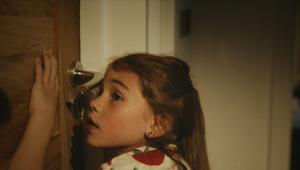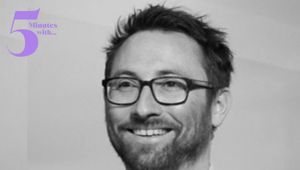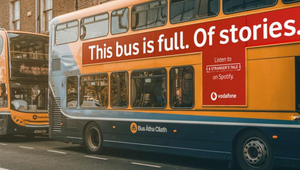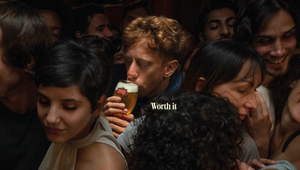
5 Minutes with… Laura Jordan Bambach

This weekend will mark the first 100 days of Laura Jordan Bambach’s tenure as president Grey London. When she first joined as CCO in April 2020 she was an unexpected choice, but an exciting one for the creative agency. And, sure enough, she helped energise the agency’s work on Volvo and Pringles and has started switching up the way the agency works, and in February she was recognised with the president position.
As the co-founder of independent agency Mr. President, Laura had proven her business leadership chops as well as her creative ones. Before that she’d worked at most of London’s top digital shops – including roles at Deepend, Glue London, LBi, and Dare. All of which places her neatly to build on the opportunities, collaboration and synergies Grey has with AKQA London following the newly formed AKQA Group, which was announced by WPP in November.
A long-term champion of diversity and inclusion in the industry, a co-founder of The Great British Diversity Experiment and also a co-founder of volunteer network SheSays, Laura is also embedding this mindset into the culture at Grey.
LBB’s Alex Reeves caught up with Laura to take stock of where her presidency at Grey is heading, and how her life has shaped that approach.
LBB> How did you feel about advertising when you were younger?
Laura> I always loved advertising. It's not anything I ever thought I would go into. Partly because I was quite a mathsy-sciency nerd as well as an arty person. I was into both of those things and so I thought I might go into industrial design or end up in installation art.
I grew up in the '80s and '90s of Australian advertising, which was just an absolute cracking time. I know everyone always says that about the ads when they were young, but there are ads that I could still recite word for word to this day. And we were kind of the home of jingles as well, which is always really fun.
Also, I was very politically aware and so I was imagining potentially I could go into politics. There are a lot of things that I thought I might do, and advertising definitely wasn't one of them.
But then I realised that actually you can have quite a lot of influence, which is what advertising is all about, in terms of making the world more progressive or making people work together or understand each other in different ways.
LBB> You had the arts and sciences sides. Why did you end up going down the arts side studying fine art at university?
Laura> I'm lucky that I got into an amazing secondary school. I was quite bullied and marginalised at primary school and then went to a school where everyone is a super nerd and is winning International Science Olympiads and that kind of stuff. It actually gave me freedom because there was no way I could come first in any of that anymore. I was always going to be somewhere in the middle because the people coming first were amazingly good. I think if I'd gone to another school maybe I would have felt the pressure to come out the other side much more nerdy.
I wanted to push my creativity as far as it could go. A lot of my work even at high school was quite political and I was really interested in using that as a medium to communicate my ideas.
LBB> And what influenced your moves into making cyberfeminist art?
Laura> I got into a fantastic art school for painting and then realised very quickly that that side of things wasn't for me. When you learned painting at this school, you had a white sphere, a white cube and a white pyramid on a white plinth. I spent the first 12 weeks painting it in black and white, in a warm colour and white, in a cool colour and white, with two different colours and black and white, and then you can paint it in realistic colours and by the time I got to realistic colours I'd just had enough. I painted everything the colours that I wanted to. My teacher pulled me up in front of class and said, "I see we have a colourist amongst us" as if it was his awful thing and I just thought, "it's not for me".
I'd been doing ‘photo media’ as a minor. I thought if I switch over and do that as a major I won't lose credit points, and I was starting to get into this digital thing.
I had amazing lecturers. The cyberfeminist movement in Australia was really strong, and I had some really incredible, quite punchy female lecturers on the digital side - really successful artists. So, I went for it and I fell in love with it. I was able to pick it up really quickly. You were kind of left to your own devices because no one else knew what you were doing. Then I realised that I could make money out of the stuff I was doing for my art. There was no one at ad agencies that knew how to do it. I'd go in and cut and code things and sleep on the floor and write their databases or do their forms or whatever. It put me through uni.
One of the other reasons I really fell in love with digital art was the internet had just been born and you could start to see that you didn't just have to talk to people in a gallery; you could create something that, at the time, 3,000 people might see. That, to me, was really fascinating - the fact that you were boundaryless, borderless, potentially genderless. I was very into Donna Haraway and a lot of those writers. It felt like a really exciting time to be able to create what we thought was going to be the internet utopia. And look how well that turned out!
LBB> You worked at a few great digital agencies early on, before founding Mr. President and becoming more integrated in your thinking. What lessons from that time do you keep with you, and what has moved on to a different way of thinking?
Laura> Number one is that creativity doesn't have to have an advertising-shaped border on it. Actually, you could apply yourself to all sorts of different business problems and you could ask a lot of your audience if you were making it with empathy and if you had what we now call ‘design thinking’ at the heart of it. If you really create something for an audience that they're going to find useful or entertaining, then people have a lot of time to spend with you.
I think the other thing is that an idea isn't a 30-second ad. Going through like the late '90s, and '00s working at digital agencies, the worst brief we ever got was being given a 30-second ad from an ATL agency saying, "turn this into something digital". It was very difficult sometimes to find the idea at the centre of it. It made me really passionate about making sure that the concepts and the ideas that we do are more brand-defining - bigger thoughts for the brand. That doesn't mean there's no space for amazing film craft as well, but there has to be something at the centre of it that allows you to break out of the ad.
LBB> What are your highlights from that part of your career, before you founded Mr. President?
Laura> It's the amazing mentors that I've had. I never would have gotten where I am without incredible mentors.
I've spoken before about Rosie Cross who I did Geekgirl with, who was phenomenal. She said, "anything you learn how to do I'll give you a platform for it". It pushed me to learn.
Simon Waterfall at Deepend saw something in me and gave me the time and attention to be able to develop enough to get my first job there. It was the coolest digital agency in the world at the time. I had no classic training, no design training, and when he would come to Sydney he'd always give me time to look at my portfolio and tell me what I needed to learn, give me some advice, and finally gave me my first job. He said, "you're still not good enough to be a designer for Deepend because we have the best designers in the world - but I'll give you a job as a producer". I started as a producer and learned from the best designers. Then he brought me to London. I jumped at the chance, came over here and learned from amazing designers. I shared a desk with Lolly from McCann [Laurence (Lolly) Thomson, now CCO at McCann UK], that was my first job in London.
There was so much talent in that organisation - and again at Lateral and again at Glue - I was just working with these insanely talented people.
The thing I loved at LBi was we went from not having a creative team at all to having an amazing creative department and award-winning work for the first time. That's about team building and supporting people to make brave decisions.
LBB> Then you set up your own agency. What was your thinking at the time?
Laura> Part of the reason for setting up Mr. President was, I was talking about the amazing creativity that came through the digital industry and that really started to die with the social media giants. As the money for digital was growing, that level of amazing digital creativity was disappearing at the same time because that's not where the money was. The money was all in social and then programmatic. I saw the writing was on the wall.
But I thought there was a lot from digital that you could apply to brands if you were actually in charge. For example, what happens if you apply design thinking to an advertising challenge? You get a lot of audience interaction through social listening. What if you applied some of that to the work that we were doing, rather than the traditional way of coming at things? What if we didn't try to fill a media plan but actually worked with the clients to figure out where things should go? Things like connections planning -which is UX/CX - were the backbone of what I knew. We felt the time was right to create an integrated agency that came from a digital point of view.
We used to have to explain what CX and connections planning was to our clients because they had absolutely no idea. Now, of course, it's really central to everything that you do. I feel good about that.
LBB> What are your strongest feelings when you remember starting your new role during lockdown in 2020?
Laura> I've realised throughout my career that I'm very comfortable being uncomfortable. Maybe it comes from that digital side where you had no idea what you were going to build when you started, but you have an agile process and it helps you get there. I like working with my clients and teams to allow them to be a bit more comfortable about being uncomfortable because that's where great work comes from.
I love them dearly and they're obviously like family, but it had become very comfortable at Mr. P. I'd been there a long time with the same team doing brilliant work in a very harmonious, very progressive agency. What I felt like I needed was to make myself a bit more uncomfortable again, throw myself in the deep end and see what happens.
Grey is such a great opportunity because creatively it has such a great name, it has brilliant clients, it has a load of people working here who are geniuses and really know what fantastic work looks like. What they needed is a lot of the stuff that I'd learned from running my own business. How do you make your systems more agile? How do you create a different shape of work? Where is the industry going? What's that next step that we're going to have to take to be relevant in the next five years? So, I jumped in there because I thought it would be fun and I'd learn a lot and it would be hard. And it's proved to be all of those things in the most wonderful way, actually. I can't express how much I am enjoying what it is that I do every day. It's really good fun.
LBB> That's great to hear! But still it’s an especially weird first year because obviously it's been during a pandemic. How has that affected the way the year has gone?
Laura> It's obviously awful and every agency went through that really awful moment. One of the first unfortunate things was reduction of staff and a lot of anxiety. There still is quite a lot of anxiety and trying to look after people without having ever met them face-to-face has been tough.
But I think it's also afforded us a lot of other opportunities to look at how and why we do things that we do, what we could be doing differently. As we're now starting to rebuild, there's an opportunity to look at what the agency should look like and what kind of skills we should have on board. And coming to diversity and inclusion, if we believe that creativity is taking two things that have never been smashed together before and smashing them together to make something new, diversity is absolutely the thing that drives creativity. How do we make sure that that is the centre of the agency as well? That's a process but we've done a lot of work on it in the last 10 months or so.
LBB> Let's talk about some work. I read that you use your mum as a sounding board a lot. Can you think of a recent opinion of hers on something you've worked on?
Laura> The latest Volvo work that we've done, 'The Ultimate Safety Test'. I shared the work with her, and she was really moved by it. She's amazing. She's a great writer of email essays, she goes really deeply into things, thinks about stuff a lot. She wrote me a really long email about the importance of what we were doing with Volvo and had done research about what Volvo was actually doing. It made me feel that we were on the right track, we had made something which maybe could be even greater than what I'd thought because her opinion was so strong on it.
She's helping a little bit with some of our case studies. There are some pieces of work which because they're more digital and experiential, it's a bit harder to tell the story in a clear way so she's been helping with that as well a little bit. I sent her a Pringles case study to see if it made sense to her.
LBB> Otherwise, what recent work have you been most proud of?
Laura> It’s definitely Pringles.
I've also been trying to encourage more of a spirit of proactivity in the agency as well. We've got about five different projects, hoping one of them will come off, in various places, which are all going to be exciting, but I don't know what's going to be called off or not because they're really ambitious, so we'll see. With those proactive pieces you really have to put a lot of love into it and, for every five or ten you put out into the universe as ideas, maybe one or two might actually get made.
LBB> Curiosity is a trait you value in this industry. Where's the strangest place (digital, physical or philosophical) that your curiosity led you recently?
Laura> I actually do an email every Friday which is a little bit like a curiosity email. Obviously, it talks about things to do with the agency but also things that I've come across in the last week.
I just opened my notes.
So, I'm exploring AI in writing quite a lot and how that comes to life. I'm really passionate about creative uses of AI.
I have been reading an article about corsets and whether actually, there's a lot of conversation about corsetry being misogynistic, but there's another branch of feminism which is saying actually it's incredibly supportive, particularly for bigger breasts.
I've been looking at some amazing architecture. There's a brand new department store in Nara in Japan, which really fascinated me.
What else? Drag queens of 1996. I was kind of part of the queer scene in Sydney at that point, and one of the best friends of my flatmate was also a drag queen called Lady Bump. And she did an amazing performance at something called Sleaze Ball. So, with Ru Paul's Drag Race Down Under starting, I've been digging out all my old videos of my mates to watch. It feels like such a long time ago now but for me it was my early '20s and I was at every performance.
I think that's one of the things I love about our job so much. You become experts in the most random things for these short periods of time. I could tell you everything about washing machines because I spent 18 months on washing machines, and I could also tell you about the vitamins that go into strengthening hair for over-50-year-old women. I love that noodling. It's one of the most fun bits of our job I think, delving in there, understanding the people using the products and what gets them going.
You absolutely never know when the dots will connect and suddenly you remember that thing that you read or whatever.
I've been reading a book called The End of Men [by Christina Sweeney-Baird], which I'm reading because I read an article by the author. It's basically about a pandemic that starts from an animal. It's like Covid but much more brutal, and it kills 92% of men. It's a really interesting piece on both grief because the first part of the book is incredibly harrowing, but then also societal and structural changes that happen because there aren't a lot of men and a lot of classic male roles suddenly aren't filled.
LBB> Apart from all of these amazing little niches of interest, what’s helped you get through the various stages of coronavirus lockdown in the UK?
Laura> I've kept a dream diary since I was 12, on and off, but I've been really putting a lot of effort into that. I found when you can't get out and see new things and absorb new stuff sometimes your brain does it for you.
I am not always as good as I could be, but I’ve been doing yoga meditation. I've always struggled with mindfulness because I find it very difficult to turn my brain off and I just wander, but it's more of a guided meditation, which I really love. I find it very calming. And I've been doing heart breathing (I know that sounds really hippy). It's like breathing from your heart space. All basically things to balance me and keep me focused so that I can do a good job.
LBB> What are your feelings looking to the future?
Laura> I am so full of excitement both for Grey and for the industry. It really feels like there's a burst of creativity coming back into what is going on now. Rather than having technology over here and the creative stuff over here, there are starting to be conversations about things being brought together. You're starting to see that in really wonderful pieces of work outside of traditional advertising. I think in the CX or brand experience spaces there's all of that creativity coming to life.
AKQA, who are obviously our sister agency now, just did an amazing piece of work for H&M. It’s a beautifully designed unit where you take your old cotton clothes, and it goes into this machine and it shreds it down and re spins it into yarn and basically knits you a new piece of H&M clothing out the other side. That's fucking cool.
So, I think there's a lot of opportunity out there, there's an eagerness from all sides to work out like different ways of working and different shaped projects. Part of that is to be faster and cheaper, but also I think I feel a creative energy that I maybe haven't felt for the last couple of years.















